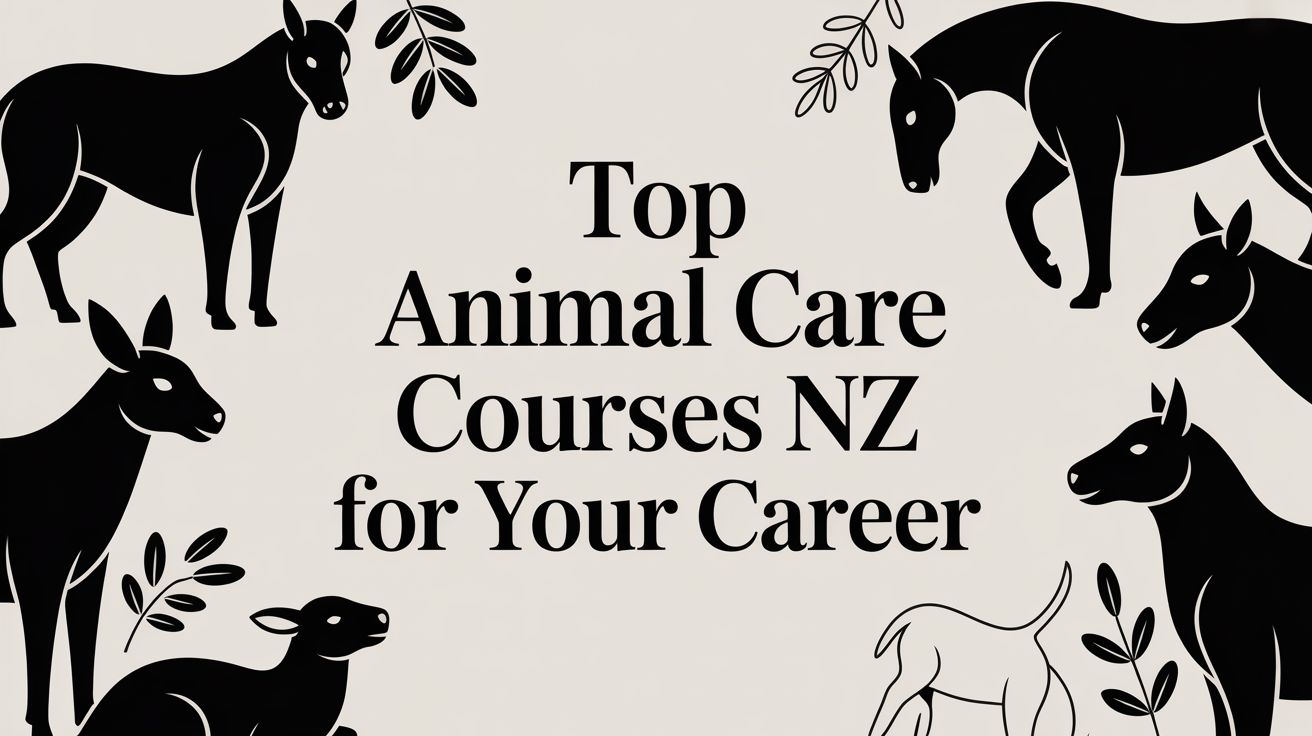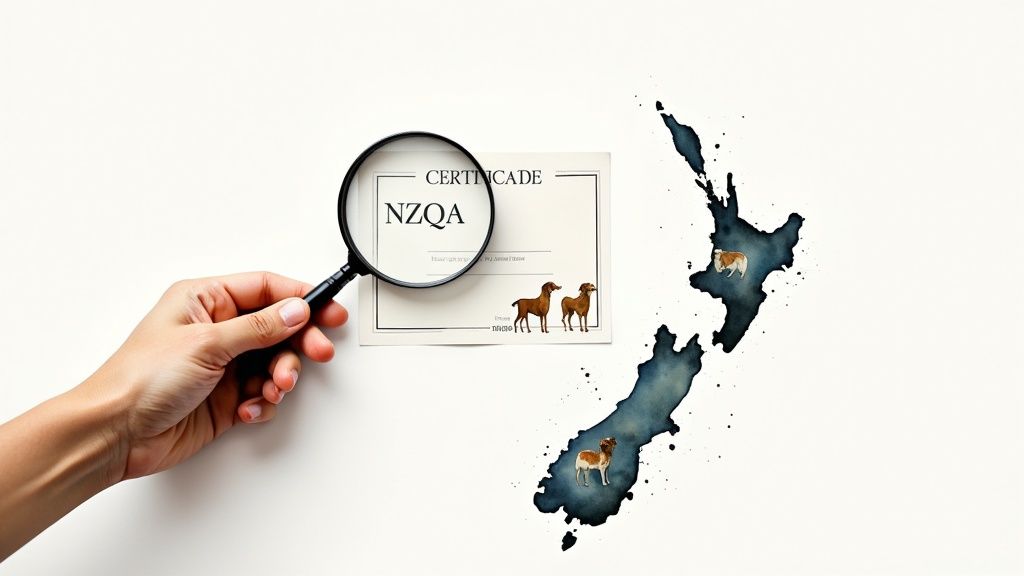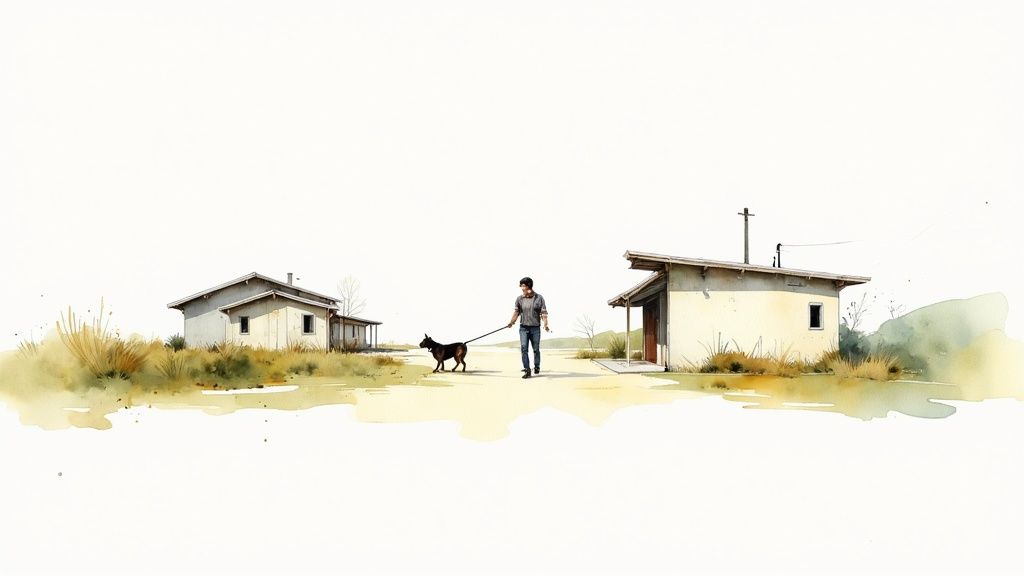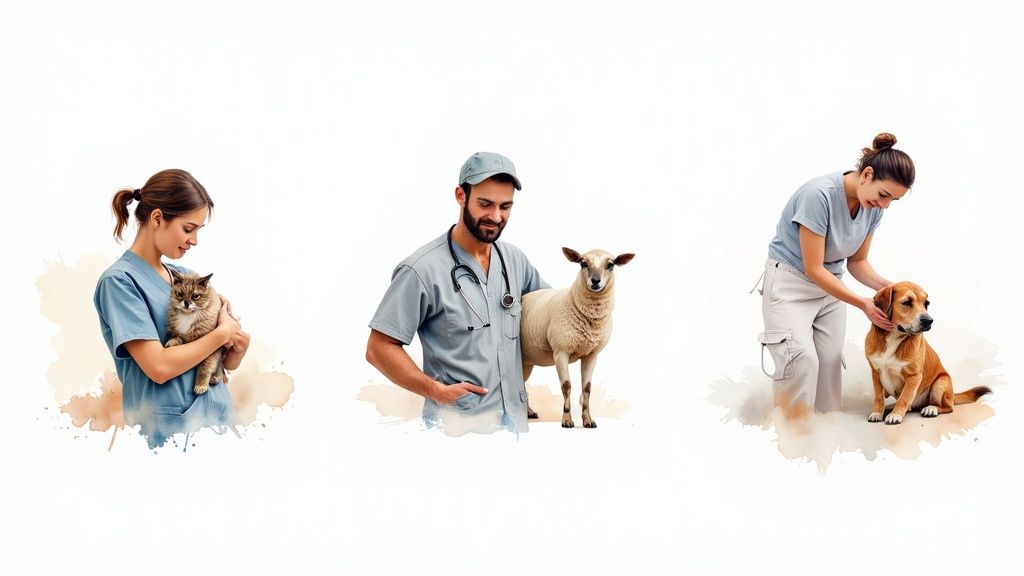
Top Animal Care Courses NZ for Your Career
If you've got a deep-seated love for animals, turning that passion into a career here in New Zealand is an incredibly rewarding path. Aotearoa's animal care sector is booming, and there's a real need for skilled people, thanks to our high pet ownership rates and world-class animal welfare standards.
Your Career Path in New Zealand Animal Care
Building a career around animals isn’t just a job—it’s a genuine commitment to their wellbeing and a chance to make a real difference every single day. In New Zealand, this isn't just a casual pursuit; it's a structured and professional field full of opportunity. Think of formal qualifications as the roadmap that guides you to a successful and impactful career.
The whole industry is becoming more professionalised. Employers are increasingly looking for people who can prove they have the right knowledge and practical skills, which is where recognised animal care courses nz come in.
This guide is your starting point. We’ll walk through everything, from foundational certificates that get you ready for hands-on roles to more advanced qualifications for specialised careers. Consider this your first step toward a profession you can be proud of, giving you the clarity and confidence to move forward.

Why Formal Training Really Matters
Passion is the fuel, no doubt about it. But formal training? That’s the steering wheel. A structured course gives you the essential knowledge that passion alone can't provide. You'll gain a proper understanding of animal health, behaviour, and husbandry, which is crucial for providing the best possible care.
Plus, getting a formal qualification has some major advantages:
- Credibility: It’s a clear signal to employers that you’re serious and have a solid grasp of industry best practices.
- Safety: You learn the right way to handle animals and follow health protocols, keeping both you and the animals safe.
- Career Advancement: A qualification is often the key that unlocks more senior roles or specialised fields like veterinary nursing or wildlife rehabilitation.
Understanding Your Earning Potential
As you map out your future, it’s smart to think about what you might earn. Salaries in the animal care sector can vary quite a bit depending on your specific role, your level of experience, and, of course, your qualifications. An entry-level kennel assistant will naturally have a different earning potential than a qualified vet nurse or a clinic manager.
Understanding what constitutes a competitive salary is an important piece of the puzzle when you're planning for the long term. More often than not, a formal qualification directly translates to a higher earning potential over time, making it a sound investment in your own future.
Finding the Right Animal Care Qualification

Choosing the right qualification is a lot like laying the foundation for a house. It needs to be solid, well-planned, and perfectly suited to what you want to build on top of it. Your entire career in animal care really does start with this single, crucial decision.
Luckily, New Zealand has a structured qualifications system that makes it much easier to find the perfect starting point. Think of the framework as a ladder – each rung represents a different level of skill and knowledge, letting you climb as high as your ambitions take you. Whether you're aiming for a hands-on role straight out of school or a specialised scientific career, there's a recognised pathway just for you.
Getting Started With Certificates: Your Foot in the Door
For most people, the journey into the animal care industry begins with a certificate. These are practical, skill-focused courses designed to get you job-ready for hands-on roles as quickly as possible. And because they are approved by the New Zealand Qualifications Authority (NZQA), employers know they can trust your training.
These courses are the building blocks, covering core competencies like animal behaviour, health, feeding, and welfare. For instance, providers like the National Trade Academy offer NZQA-approved programmes from Levels 2 to 4 that prepare you for the real world. Some courses, like the Level 2 Animal Care course, are even free for eligible students through the Youth Guarantee scheme, making them incredibly accessible.
A certificate is your passport into the industry. It proves you have the core, non-negotiable skills needed to work safely and effectively with animals from day one.
With a certificate under your belt, you’ll be well-prepared for roles in places like:
- Boarding kennels or catteries
- Animal shelters and rescue organisations (like the SPCA)
- Pet shops
- Doggy daycare centres
- Grooming salons
Advancing With Diplomas and Degrees
Once you've got a solid foundation, or if you're aiming for a more specialised role right from the get-go, diplomas and bachelor's degrees are the next rungs on the ladder. These qualifications dive much deeper into the science and management side of animal care. They’re a bigger time commitment and often have stricter entry requirements, like NCEA credits in science subjects.
A diploma, for example, is the standard qualification needed to become a qualified veterinary nurse in New Zealand. This path gives you advanced clinical skills and a much deeper understanding of animal anatomy, pharmacology, and surgical procedures.
A bachelor's degree takes you even further, opening doors to careers in:
- Animal Welfare Science: Working with organisations to improve animal living standards.
- Biosecurity: Protecting New Zealand's unique fauna from threats.
- Conservation: Contributing to vital programmes that protect our native species.
- Zoo and Wildlife Management: Caring for exotic or native animals in specialised environments. If this is your passion, a specialised online programme like a Certificate in Zoology can be an excellent first step.
Upskilling With Micro-Credentials
Your learning journey doesn't just stop once you land a job. The animal care industry is always evolving, with new research and best practices popping up all the time. Micro-credentials and Continuing Professional Development (CPD) courses are the perfect solution.
These are short, targeted programmes designed for professionals already working in the field. They let you specialise in a particular area—like canine behaviour, animal nutrition, or exotic animal care—without having to commit to another full-length qualification. They are a fantastic way to sharpen your expertise, increase your value to employers, and keep the passion for your work alive.
To help you visualise these pathways, we've put together a simple comparison.
Comparing Animal Care Qualification Pathways in NZ
This table breaks down the different types of animal care qualifications available in New Zealand, giving you a clear picture of the time commitment, focus, and career outcomes for each.
Choosing the right path depends entirely on your personal and professional goals. Whether you want to get your hands dirty right away with a certificate or dive deep into the science with a degree, there's a qualification that will get you where you want to go.
Where to Study Animal Care in New Zealand

Choosing where to study is just as important as deciding what to study. The right institution does more than just hand you a qualification; it shapes your skills, builds your industry connections, and defines your entire learning experience. Thankfully, New Zealand is home to a fantastic range of providers, each with its own unique flavour of animal care education.
Your decision will probably boil down to your preferred learning style. Do you thrive in a bustling campus environment with top-notch facilities? Or do you need the freedom of online study to juggle your current commitments? Let's take a look at some of the top places to find the animal care courses NZ has to offer.
Polytechnics The Hubs of Hands-On Learning
Polytechnics, now part of Te Pūkenga, are celebrated for their practical, skills-first approach. They are deeply wired into local industries, which means their programmes are built to meet the real-world needs of employers. This focus on vocational training is what makes their graduates so sought after.
Institutions like Unitec in Auckland and Otago Polytechnic in Dunedin are perfect examples. They offer a whole spectrum of qualifications, from foundational certificates in animal care to specialised diplomas in veterinary nursing. Their campuses often feature purpose-built facilities, like vet clinics and animal handling labs, giving you invaluable hands-on experience right from day one.
These providers are brilliant at blending theory with practice through:
- Work Placements: Structured work experience is often a core part of the curriculum. You’ll get to apply your skills in real vet clinics, shelters, or on farms.
- Industry-Experienced Tutors: You’re learning from people who have been there and done that. They bring current, practical knowledge from years in the field straight into the classroom.
- Specialised Streams: Many polytechnics let you follow specific pathways, such as rural animal technology or companion animal services, to match your career goals.
Private Training Establishments Immersive and Focused
Private Training Establishments (PTEs) offer another excellent route, often providing highly specialised and immersive learning environments. They have a reputation for being agile and quick to respond to industry demands, with a laser focus on student success and employment outcomes.
A great example is the National Trade Academy (NTA) in Christchurch. NTA is known for its unique setup, which includes an on-site farm park. This gives students incredible daily access to a huge variety of animals, creating a truly hands-on learning experience that a textbook simply can't replicate.
Choosing an institution isn't just about the piece of paper you get at the end. It's about finding an environment that inspires you, challenges you, and connects you directly to the industry you're passionate about joining.
Universities For Advanced Scientific Study
For those with their sights set on a career in research, welfare science, or advanced management, New Zealand's universities offer world-class degree programmes. These courses lay down a deep, scientific foundation for understanding animal biology, behaviour, and health.
Universities like Massey University offer specialised Bachelor of Animal Science degrees that dive into rigorous scientific coursework. Similarly, Unitec offers a Bachelor of Applied Science in Animal Behaviour and Welfare and Biodiversity Management, which often needs a foundational qualification like the New Zealand Certificate in Animal Care to get in. You can learn more about these degree pathways and their entry requirements on the Unitec website.
Online Providers The Future of Flexible Learning
In today's busy world, flexibility is everything. Online learning has become a hugely popular and effective way to gain an animal care qualification without putting your life on hold. These courses let you study from anywhere in New Zealand, fitting your learning around work, family, or whatever else you have going on.
Reputable online providers deliver high-quality, structured content that covers all the essential theoretical knowledge. Many of these programmes, especially at the certificate level, are designed to be self-paced and practical. For anyone keen to explore a range of flexible options, you can browse a variety of online animal care courses that cater to all sorts of different interests and career goals.
Financing Your Animal Care Education
Figuring out the financial side of your studies is a massive step in turning your love for animals into a real-world career. The numbers can feel a bit overwhelming at first, but the good news is that New Zealand has some excellent funding options to make education much more accessible.
Think of it like planning a big trip – you need to map out the costs and figure out the best way to fuel your journey. Let's break down the typical expenses and the funding opportunities available for students wanting to enrol in animal care courses NZ-wide.
Understanding the Costs
The price tag on an animal care qualification in New Zealand can vary quite a bit, depending on where you study and what level you’re aiming for. A foundational certificate might set you back a few thousand dollars, while a more in-depth diploma or a full three-year degree is obviously a much bigger investment.
Your best bet is always to check directly with the institution you’re interested in. They’ll give you a clear breakdown of tuition fees, any costs for materials, and other associated expenses, which makes budgeting from day one a whole lot easier.
Government Support and Funding Schemes
The New Zealand government has put some great initiatives in place to help lighten the financial load for students. These programmes are specifically designed to lower the barrier to entry and support people on their learning path.
Here are a couple of key options to look into:
- Fees Free: This is a fantastic scheme for anyone new to tertiary study. If you’re eligible, the government could cover your tuition fees for your first year, up to a total of $12,000.
- Youth Guarantee: Aimed at young learners between 16 and 24, this scheme gives you the chance to study certain Level 2 and 3 courses without paying any fees. Many of the foundational animal care certificates fall into this category.
Programmes like these can make a huge difference, allowing you to focus on your assignments instead of stressing about money.
Don't let financial worries stop you from chasing your dream career. With a bit of planning and the right information, funding your animal care course is completely doable.
Loans and Allowances Through StudyLink
When it comes to ongoing financial help, StudyLink is the main port of call for students in New Zealand. It’s the government agency that helps learners access Student Loans and Allowances to cover both their course fees and living costs.
Here’s a quick rundown of how it works:
- Student Loan: This is designed to help pay for your course fees and course-related costs (like textbooks or specialist gear). You can also get a weekly payment to help with living expenses. It’s a loan, so you will need to pay it back once you start earning over a certain amount.
- Student Allowance: This is a weekly payment to help with living costs that, for most people who qualify, does not need to be paid back. Whether you’re eligible depends on things like your age, your income, and if you're under 24, your parents' income.
The application process on the StudyLink website is pretty straightforward, but it’s a good idea to get onto it early to make sure everything is sorted well before your course kicks off.
Scholarships and Grants
Beyond the big government schemes, don’t forget to look for scholarships. Many institutions and even industry organisations offer grants specifically for students heading into animal care. These are essentially pots of money to support your studies that you don't have to repay.
Scholarships can be awarded for all sorts of reasons—academic achievement, financial need, or even your connection to a specific community. Make sure you check the scholarships page of your chosen polytechnic, university, or private training provider to see what you might be able to apply for.
Connecting Your Studies to Your Future Career

Finishing an animal care course is about so much more than just getting a piece of paper. It’s the moment your passion transforms into practical, real-world skills that employers all across New Zealand are looking for. Every module you complete is another stepping stone, building a clear path from your studies to a career you'll love.
Think of your qualification as a toolbox. Each subject—from animal anatomy to welfare regulations—is a specialised tool you'll use to solve problems and provide top-notch care in a professional setting. Let's dig into how the knowledge you gain connects directly to the exciting job opportunities waiting for you across Aotearoa.
From Theory to Practice: The Core Skills You’ll Learn
Your course will dive deep into the fundamentals of animal care, giving you a solid, practical understanding of what it really takes to look after animals responsibly. These core subjects aren't just academic exercises; they're the bedrock of your future career, making sure you’re ready for the daily challenges and rewards of the industry.
You'll get to grips with essential topics like:
- Animal Anatomy and Physiology: This is the blueprint for understanding how animals' bodies work. This knowledge is absolutely critical in vet clinics when assisting with treatments, or in shelters for spotting the subtle signs of injury or illness.
- Species-Specific Behaviour: Knowing why a dog behaves a certain way or what a cat’s body language is telling you is a vital skill. It's the foundation for roles in animal training, shelter enrichment, and managing a doggy daycare.
- Nutrition and Feeding: Understanding the dietary needs of different animals is non-negotiable. This is essential for jobs in pet retail, running a kennel, and giving sound advice to clients in a vet clinic.
- Health, Hygiene, and Welfare Standards: This ensures you can maintain a safe, clean, and humane environment for every animal in your care. It’s a core competency for every single role, from animal control officer to groomer.
The real value of your qualification lies in its application. It’s the bridge that takes you from someone who loves animals to a professional who can expertly care for them.
This foundational knowledge doesn't just stay in a textbook. It’s what you’ll draw on every day when you’re calming an anxious dog, creating a feeding plan for a rescued cat, or spotting the early signs of sickness in a flock of birds.
Unlocking a Diverse Career Landscape
With these skills in your toolbox, a huge range of career paths opens up across New Zealand. The animal care sector is far more diverse than most people think, stretching well beyond the traditional vet clinic or shelter. Your qualification is the key that can unlock doors into some really specialised fields.
For example, a solid grasp of animal behaviour and psychology—a key part of many animal care courses NZ offers—sets you up perfectly for a career as an animal trainer. Whether you want to focus on obedience, agility, or tackling behavioural issues, your studies give you the scientific framework you need to succeed. If that sounds like you, a targeted online programme like a Certificate in Dog Training can give you the specialised skills to turn that passion into a profession.
Likewise, if you finish a course with a focus on rural animal technology, you’ll be primed for work on farms, helping vets with large animals like cattle and sheep. A companion animal stream, on the other hand, leads directly to roles in urban environments.
Here’s just a snapshot of the varied career landscape:
- Veterinary Services: Working as a vet nurse or clinic assistant.
- Animal Welfare: Roles at organisations like the SPCA.
- Grooming Businesses: Owning your own salon or working for an established one.
- Boarding Facilities: Managing kennels, catteries, or pet hotels.
- Conservation and Biosecurity: Protecting New Zealand’s precious native species.
- Pet Retail and Nutrition: Advising customers on the best products for their pets.
The demand for skilled professionals in these areas is strong and growing. Recent insights show a dynamic job market, fuelled by New Zealand's famously high rate of pet ownership. As of 2025, there are over 500 animal care job vacancies across the nation. This lines up with reports that nearly two-thirds of Kiwi households now own a pet—you can dig into these trends in Companion Animals New Zealand's impact report. This growing demand confirms that investing in a quality education is a smart move toward a stable and incredibly rewarding career.
Your Guide to the Enrolment Process
Jumping into the enrolment process for an animal care course in NZ can feel a bit daunting, with all the forms and deadlines. But honestly, once you know the steps, it’s a pretty clear path. Think of it as your first practical test in being organised and paying attention to detail – two skills that are absolutely essential when you're working with animals.
The whole point of the process is to make sure you and the course you’ve picked are the right fit for each other. It’s all about setting you up for success right from day one. Let’s walk through what you need to do, from figuring out if you meet the criteria to hitting ‘submit’ on your application.
Checking the Entry Requirements
Before you get your heart set on a specific course, the very first thing to do is check the entry requirements. Every qualification has its own set of prerequisites, and they can vary a lot, especially between a foundational certificate and a more advanced diploma.
For most certificate-level courses (like NZQA Levels 2-4), what providers really want to see is a genuine passion for animals and a can-do attitude. Simple as that. But for higher-level diplomas or degrees, you might need a bit more under your belt:
- Specific NCEA Credits: You’ll often need credits in subjects like Biology or other sciences.
- A Portfolio of Experience: Some providers might ask for proof you've volunteered at a shelter, vet clinic, or similar place.
- A Completed Foundational Certificate: This is a common stepping stone to get into more specialised programmes.
Always, always read the course description on the provider's website from top to bottom. This one simple check can save you a ton of time and make sure you’re applying for something you’re actually eligible for.
Preparing Your Application Documents
Okay, so you’ve confirmed you meet the criteria. Awesome! Now it’s time to get your documents in order. Having everything ready to go before you start the online application will make the whole thing feel a lot less stressful.
Here’s a typical checklist of what you’ll need to prepare:
- Proof of Identity: This is usually a certified copy of your birth certificate or passport.
- Academic Transcripts: Your official record of achievement from high school (NCEA) or any other tertiary study you’ve done.
- A Personal Statement or CV: Here’s your chance to really shine and show them why you’re so passionate about the animal care industry.
Your application is more than just paperwork; it’s the story of why you are the right fit for the course. Take the time to make a great first impression.
A standout application often comes down to a well-written personal statement. This is where you can go beyond grades and really communicate your dedication and what you hope to achieve. For some great examples and advice, check out this brilliant resource on crafting a compelling personal statement to see what a successful one looks like.
Finally, don't forget to keep an eye on the key dates. Application deadlines and semester start times are non-negotiable, so pop them in your calendar. Being prepared and on time shows a level of professionalism that’s highly valued in any animal care role.
Common Questions About Animal Care Courses
Thinking about a new career path always brings up a bunch of questions, especially for a hands-on and rewarding field like animal care. To give you some quick clarity, we’ve put together answers for the most common queries we hear from people just like you.
Think of this as your go-to guide for those practical questions that pop into your head while you're figuring out your next move. Getting these details sorted is the best way to move forward with confidence.
Do I Need Prior Animal Experience to Enrol?
While a real passion for animals is the number one thing you need, most entry-level certificates (like those at NZQA Level 2 or 3) don’t actually require you to have formal work experience. These courses are designed to teach you everything from the ground up, building your skills and confidence right from day one.
That said, any experience you do have can definitely strengthen your application. Volunteering at a local SPCA, a vet clinic, or even a cattery shows your dedication and gives you a real-world taste of what the industry is like. Keep in mind that higher-level qualifications, like diplomas or degrees, will often have stricter entry requirements, which might include specific NCEA science subjects or a completed foundational certificate.
What Is the Difference Between a Vet Nurse and a Vet Tech?
This is a common point of confusion in New Zealand because the terms are often used interchangeably. But there is a general distinction based on where you'd typically work and what your focus would be.
- A Veterinary Nurse usually holds a diploma and works mainly in a clinical setting with companion animals like cats and dogs. Their role is all about assisting with surgery, providing patient care, and talking with clients.
- A Rural Animal Technician (RAT), on the other hand, tends to focus on large production animals. You'll often find them working out in the field on farms, helping veterinarians with livestock health.
Thinking about your ideal career—whether you see yourself in a busy urban clinic or out in the countryside—will really help you choose the right qualification.
"Understanding these role distinctions is key. Your choice of course should align directly with the type of animal care work you are most passionate about pursuing long-term."
Can I Study an Animal Care Course Part-Time?
Absolutely. Many New Zealand institutions get that students often need to juggle their studies with work, family, or other commitments. Because of this, flexible part-time study options are widely available.
Choosing a part-time schedule just means you'll spread the course out over a longer period. For example, a certificate that takes one year of full-time study might take two years to finish part-time. This kind of flexibility is especially common with online courses, letting you learn at a pace that suits you. It’s always best to check directly with your chosen provider to confirm their specific part-time availability and course structure.
Are Online Animal Care Courses a Good Option?
Online courses are a fantastic, flexible way to get your head around the theoretical side of animal care. But since this is such a hands-on field, the best online or blended programmes will always include a mandatory practical component. You can't learn it all from a screen.
This usually involves completing a set number of work experience hours at an approved facility, like a vet clinic, grooming salon, or animal shelter. When you're looking at the online animal care courses NZ has to offer, it’s crucial to check their accreditation and practical requirements. This is what ensures the qualification meets the industry standards employers look for, making you properly job-ready the moment you graduate.
Article created using Outrank
.webp)

